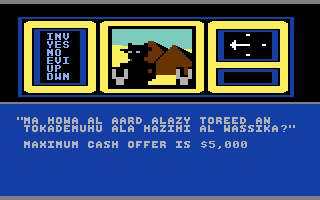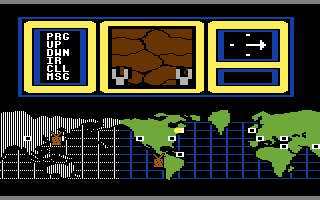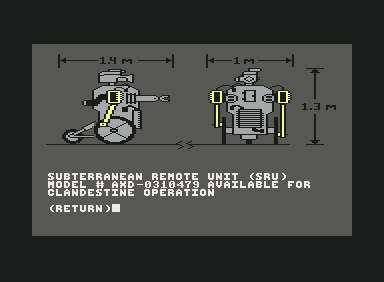The Story Behind: Hacker
Please Logon...beep...beep...
When purchasing a game for your selected platform it's reasonable to expect some degree of instruction to wheedle you into the game and make the experience enjoyable from the outset. A detailed run down of the gameplay mechanics; half a dozen pages of scene-setting back story; a detailed look at the available armoury and even some helpful hints all assist the player in 'bonding' with the game.
Hacker threw caution to the wind and provided the player with absolutely no clue as to what they had to do. Once loaded, the game displayed nothing but a blue screen with a 'Logon' prompt. It was then down to the inquisitive player to figure out what the hell to do next.
Hacker itself was the culmination of nine months hard work for developer Steve Cartwright. Despite having created previously sublime gaming titles on the Atari 2600 - such as Barnstorming and Plaque Attack - Hacker was Cartwright's first home computer development.
"The game was initially an underground mail delivery simulation," says Cartwright. "Then it evolved into an 'International mystery theme' where a remote controlled robot travelled the globe exchanging items to piece together a plot." With Activision's probing finger firmly on the pulse of commercial viability in the hectic videogaming market of the day, the title of "Hacker" was decided upon.
As Cartwright remembers, "Computer 'hacking' was the big news that year, so [the producer] convinced Activision to reluctantly use the title 'Hacker'." With the recent release of the respected Matthew Broderick film, Wargames, bringing in the big bucks at the box office, Activision aimed to sell the title to those who'd been infected with the hacking bug. Cartwright is eager to deny any kind of influence by the film, however. "I believe the code had been completed by the time that movie came out. The related themes were just a coincidence of timing based on current events," he recalls.

The blurb on the back of the Hacker box contained all the info you needed to get started. You'd apparently spent a long night working the electronic bulletin boards, but as you decided to log off for the evening you accidentally enter a wrong phone number, only to be greeted by an ominous blue screen, displaying two enticing words: LOGON PLEASE.
Immediately you're hooked. You've no idea what computer system you've hacked in to. It could be an FBI database, or it could just be a fellow geeky computer owner a few streets away. It could even be a poor guy taking his collection of electronics online for the very first time. As you progress, you eventually take control of a small, remote controlled robot as you exchange items with spies all around the world; piecing together the plot of a mysterious espionage scheme you've become embroiled in. Your ultimate goal is to gather all the individual shreds of a secret document, containing the clandestine plans of Magma Ltd's nefarious goal of world domination.
Activision, as a company, was going through various hardships at the time, as Cartwright remembers. "Activision had gone from US$600 million a year in sales to about US$20 million. 50% of the employees were laid off. All salaries were cut in half. I was actually teaching engineering classes at night to supplement my income." Hence a protracted nine months after first setting out on his computer based project, Hacker was ready to be shown to the public.

Due to time constraints, and Cartwright's necessary acclimatisation with the Commodore 64's development procedures before beginning programming, several features had to be left out, such as a save/load function. "Due to time pressures, we unfortunately talked ourselves into believing that having a game save/resume feature made it seem more like a "game" and less like you were actually hacking into a computer system," said Cartwright on where he feels Hacker could have been enhanced.
With Activision's financial situation worsening by the day, the decision was made to push Hacker out onto the shelves as quickly as possible. Quite how much a save and load feature would have changed Hacker's gameplay is open to debate, but its omission certainly didn't mask the apprehensive suspense and thick, palpable atmosphere that permeated the game.
But even as Cartwright and Activision moved to finally display Hacker publicly at the Chicago CES, most of the people involved were still unsure about how successful a title based on computer hacking would actually be be.

"Everyone was still unsure about the product as we headed to Chicago for Summer CES," explains Cartwright. "As I demonstrated the game, I informed the press that the floppy disk had been damaged on the flight to Chicago, so I needed to use the modem to connect to the Activision mainframe back in California and download the latest version of the game. I typed in a few commands, and the infamous "LOGIN" prompt appeared. I entered a "bogus" username, and then acted baffled as my repeated attempts to login to Activision failed." A wonderfully duplicitous performance mirroring our own first thoughts as we repeatedly entered random titles during that first, hesitant interaction with Hacker. Cartwright continues:
"When the 'game' informed me that I had stumbled into a secret computer system, it became clear that everyone had actually bought into the whole charade. At that point, we knew we had a hit!" he laughs, recalling how he first witnessed how the core principle of Hacker's gameplay adeptly threw gamers off their guard and established the illicit sensation of tip-toeing through a larger, and more dangerous world than existed before the disk was inserted.
Hacker was all about atmosphere. The tension of finding yourself venturing where you don't belong has only been equalled by Introversion Software's sublime hacking masterpiece, Uplink. It's no coincidence that the only games containing such a sense of atmosphere were both based on the idea of hacking a prohibited computer system.

A mere year after Hacker stormed the charts to become what Cartwright called an "accidental hit", the sequel appeared and improved on it's older brother in a variety of different ways, as Cartwright recalls:
"A much better game, in my opinion, was the follow-up Hacker II," he begins. "The player still controlled a remote robot, but you were navigating through hallways, avoiding roaming guards and timing your way past security cameras. It may have been the first attempt at a stealth game, a genre that later became infamous with games like Metal Gear Solid."
Whether or not Hideo Kojima played and enjoyed the Hacker as much as the rest of the gaming world, and felt its influences when designing the Metal Gear titles, we can't say for sure. But what ultimately can't be faulted is the sheer delight of a title that managed what only the very best text adventures of the time had ever done - drawing gamers into a brand new world and giving them the abilities to make a difference; the opportunities to discover that world and determine their place within it. To act so audaciously and to take control of a situation that really, genuinely mattered. Hacker gave gamers the choice to become a hero, and made a champion of the computer literate for the first time.
